
Boston Region MPO 2014 Title VI Report
Project Manager
Alicia Wilson
Project Principal
Pam Wolfe
GIS
Mary McShane
Paul Reim
Graphics
Jane Gillis
Cover Design
Jane Gillis
The preparation of this document was supported
by the Federal Highway Administration through
MassDOT 3CPL contract #78890 and the Federal Transit Administration through MassDOT 5303 contract #78922.
Central Transportation Planning Staff
Directed by the Boston Region Metropolitan
Planning Organization. The MPO is composed of
state and regional agencies and authorities, and
local governments.

Title VI of the Civil Rights Act of 1964 (42 United States Code (USC) §2000d) provides that “no person in the United States shall, on the grounds of race, color, or national origin, be excluded from participation in, be denied the benefits of, or be subject to discrimination under any program or activity receiving federal financial assistance.” To fulfill this basic civil rights mandate, each federal agency that provides financial assistance for any program is authorized and directed by the United States Department of Justice to apply provisions of Title VI to each program by issuing applicable rules, regulations, or requirements. As federal agencies, the Federal Transit Administration (FTA) and the Federal Highway Administration (FHWA) require that funding recipients have Title VI programs and document their programs and activities.
As a subrecipient of funding from both FTA and FHWA, the Boston Region Metropolitan Planning Organization (MPO) has prepared this report that explains its Title VI program. The program, conducted in cooperation with the Massachusetts Department of Transportation (MassDOT), is consistent with the principles of Title VI, federal guidelines, and related requirements and is responsive to the needs of Title VI beneficiaries.
Table of Contents Page
Chapter 2—General Reporting Requirements
2.1 Annual Title VI Certifications and Assurances
FFY 2014 FTA Certifications and Assurances
FFY 2014 FHWA Certifications and Assurances
2.2 Notice of Nondiscrimination Rights and Protections to Beneficiaries
Federal “Title VI/Nondiscrimination” Protections
State Nondiscrimination Protections
2.3 Boston Region Metropolitan Planning Organization 2014 TITLE VI Program Member Endorsement
2.5 Title VI Investigations, Complaints and Lawsuits
2.6 Meaningful Access for Persons with Limited English Proficiency (LEP)
Chapter 3—General Reporting Requirements
3.2 BOSTON REGION MPO PUBLIC PARTICIPATION PLAN
3.5 MPO TRANSPORTATION EQUITY PROGRAM
Summary of Concerns and Issues
Feedback to Community Partners
3.5.2 MPO Coordinated Public Transit Human-Services Transportation Plan
3.6 Access Advisory Committee to the MBTA (AACT)
3.7 Regional Transportation Advisory Council
Chapter 4—Assessment of the Metropolitan Planning Process
4.3 THE TRANSPORTATION PLANNING PROCESS
4.4.2 Data Used for Title VI Purposes
4.4.3 Transportation Equity (Environmental Justice) Outreach to Underserved Populations
Identification of Needs of Low-Income and Minority Populations
Identification of Benefits and Burdens
4.5 TIP Projects In or Near Environmental Justice (EJ) Zones
Appendix A—Complaint Procedures
Appendix B—Boston Region MPO Language-Assistance Plan (February 2014)
B.1.1 Boston Region MPO Policy
Factor 1: Number and Proportion of LEP People in the Boston Region MPO Area
Factor 2: Frequency of Contact
Factor 3: The Importance of the Service Provided by the Program
Factor 4: Resources Available to the Recipient
B.3.1 Oral Language Assistance
B.3.2 Written Language Assistance
B.4 MONITORING AND UPDATING THE PLAN
Appendix C—Boston Region MPO Draft Public Participation Plan
Appendix D—Boston Region MPO Memorandum of Understanding and Advisory Council Bylaws
Appendix E—Boston Region MPO Notice Samples
Appendix F—Boston Region MPO Public Meeting Summary
Appendix G—Environmental Justice Invitation to Participate
Appendix H—Human Services and Equity in Transportation Forum Prospectus and Invitation
I.1 Transportation Equity/Environmental Justice Support (funded on an ongoing basis)
I.2 Analysis of JARC and New Freedom Projects (funded in FFY 2012)
I.3 MetroWest RTA Transit Planning Assistance (funded in FFY 2013)
I.4 Disability Access Support (funded on an ongoing basis)
I.5 Priority Corridors for LRTP Needs Assessment (funded in FFY 2012)
I.7 Environmental Justice and Title VI Analysis Methodology Review
(Funded in FFY 2014)
I.8 Impacts of Walking Radius/Transit Frequency and Reliability
(funded in FFY 2012)
I.9 MBTA Bus Route 1 Transit Signal Priority (funded in FFY 2011)
I.10 Sullivan Square/Rutherford Avenue Land Use Visioning
(Funded in FFY 2013)
Appendix J—Long-Range Transportation Plan Development
Appendix K—Transportation Improvement Program Process
K.1 Transportation Improvement Program—Development
K.2 Outreach and Data Collection (December–February)
K.3 Evaluation of Projects (February–March)
K.4 Staff Recommendation and Draft TIP (March–April)
K.5 Public Review and Endorsement (April–June)
Appendix L—Long-Range Transportation Plan Benefits and Burdens Analysis
Table of Tables and Figures Page
Table 2 RACIAL CHARACTERISTICS* OF THE BOSTON REGION MPO AREA
Figure 1 Low-income and Minority Populations
Table 3 NON-ENGLISH SAFE HARBOR LANGUAGES IN THE BOSTON REGION MPO
Table 4 NON-ENGLISH SAFE HARBOR LANGUAGES IN THE BOSTON REGION MPO*
Figure 2 Environmental Justice Areas of Concern
Table 5 Federal Fiscal Years 2012-2017 TIP Project Information
Figure 3 FEDERAL FISCAL YEARS 2012-2017 TIP PROJECT INFORMATION
Figure 4 FEDERAL FISCAL YEARS 2012-2017 TIP PROJECT COSTS
TABLE B.1 NON-ENGLISH SAFE HARBOR LANGUAGES IN THE BOSTON REGION MPO.
Figure B-1 Populations with Limited-English Proficiency
Figure B-2 Limited-English Proficiency: Spanish Speakers
Figure B-3 Limited-English Proficiency: Chinese Speakers
Figure B-4 Limited-English Proficiency: Portuguese Speakers
Figure B-5 Limited-English Proficiency: French Creole Speakers
Figure B-6 Limited-English Proficiency: Vietnamese Speakers
Figure B-7 Limited-English Proficiency: Russian Speakers
Chapter 1—Introduction
Title VI of the Civil Rights Act of 1964 (42 United States Code (USC) §2000d) provides that “no person in the United States shall, on the grounds of race, color, or national origin, be excluded from participation in, be denied the benefits of, or be subject to discrimination under any program or activity receiving federal financial assistance.” To fulfill this basic civil rights mandate, each federal agency that provides financial assistance for any program is authorized and directed by the United States Department of Justice to apply provisions of Title VI to each program by issuing applicable rules, regulations, or requirements. The Federal Transit Administration (FTA) of the United States Department of Transportation issued guidelines on May 26, 1988, FTA C 4702.1, describing the contents of Title VI compliance programs to be adopted and maintained by recipients of FTA-administered funds for transit programs. The latest FTA guidance, FTA C 4702.1B, was issued on October 1, 2012.
The Federal Highway Administration (FHWA) issued guidance in U S Code Title 23, Section 200 on April 1, 2011 and updated it on April 1, 2013.
Although Title VI is the focal point of nondiscrimination law in this country, FHWA incorporates a broader application of nondiscrimination statutes, regulations, and Executive Orders into its Title VI program requirements for states and their subrecipients. For example, Section 324 of the Federal-Aid Highway Act of 1973 prohibits discrimination based on sex; Section 504 of the Rehabilitation Act of 1973 prohibits discrimination on the basis of disability status, as does the Americans with Disabilities Act of 1990; and the Age Discrimination Act of 1975 prohibits age discrimination. In addition, the Civil Rights Restoration Act of 1987 (FHWA Notice 4720.6) clarified the original intent of Congress with respect to Title VI by restoring the broad, institution-wide scope and coverage of the nondiscrimination statutes to include all programs and activities of federal-aid recipients, whether or not such programs and activities are federally assisted; and it enforced application of the laws that include nondiscrimination on the basis of race, color, national origin, age, gender, or disability.
In addition, the principles of Executive Order 13166 on limited English proficiency (LEP) are incorporated to ensure that meaningful access is provided to persons who are not proficient in the English language. This guidance is based on the prohibition against national origin discrimination in Title VI of the Civil Rights Act of 1964, as it affects the LEP population.
This document explains the Boston Region MPO’s Title VI program, which—conducted in cooperation with the Massachusetts Department of Transportation (MassDOT)—is consistent with the principles of Title VI, federal guidelines, and related requirements, and is responsive to the needs of Title VI beneficiaries.
Chapter 2 of this report addresses the MPO’s general reporting requirements under the circular including FTA and FHWA certifications and assurances; certification that the MPO as a body has approved this document; the MPO’s notice to the public regarding Title VI protections; a description of the procedures for filing civil rights complaints; a list of Title VI discrimination complaints, investigations and lawsuits; and the MPO’s plan to provide meaningful access to persons with limited English proficiency. Chapter 3 describes the MPO’s public outreach and public participation activities and highlights how the MPO reaches out to minority, LEP, and low-income populations. Chapter 4 provides an assessment of the MPO’s planning process, a demographic profile of the MPO region, and a description of the strategies used to identify the needs of minority and low-income residents.
The MPO’s Title VI assurances for federal fiscal year 2014 are cited beginning on page 9 of this report. Please note that the text of these assurances is not accessible to individuals with low or no vision who use a screen reader.

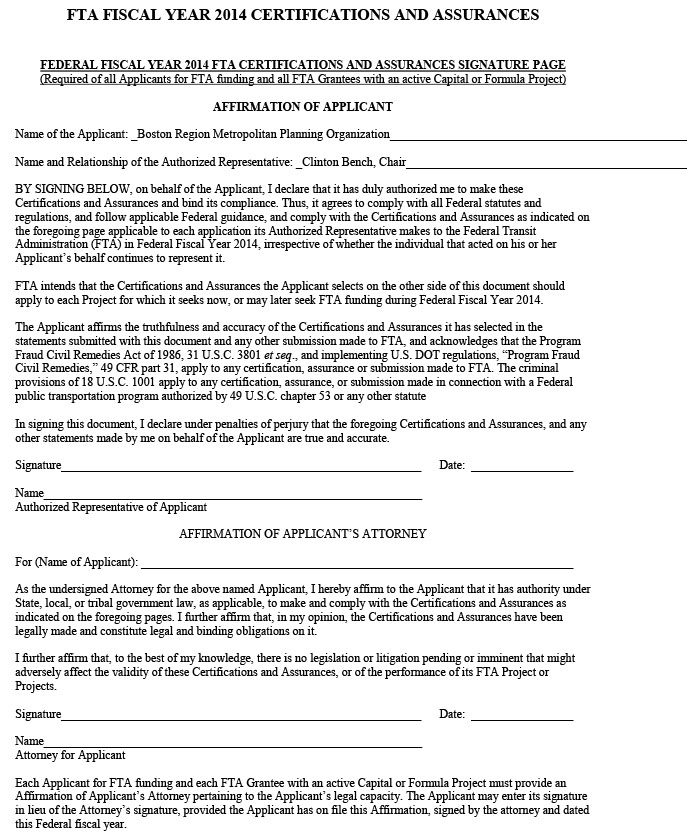
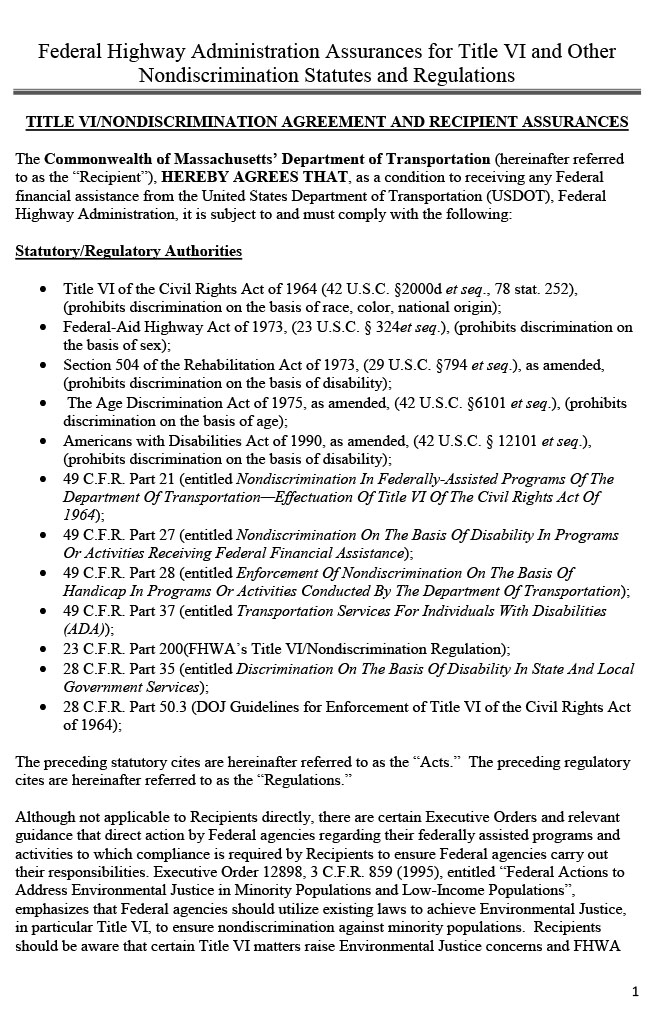
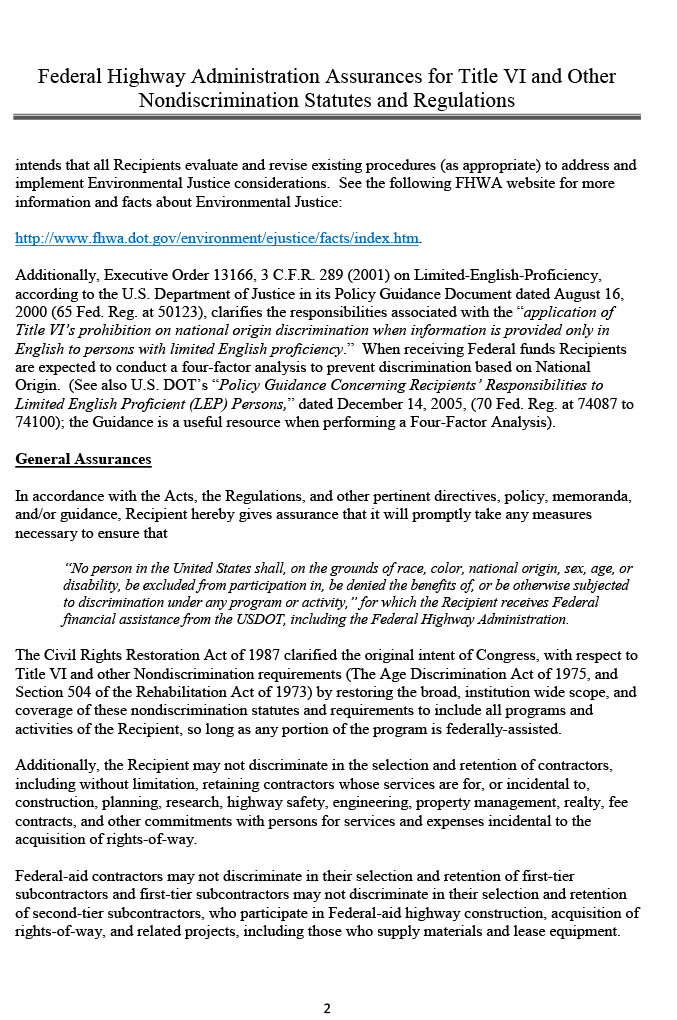

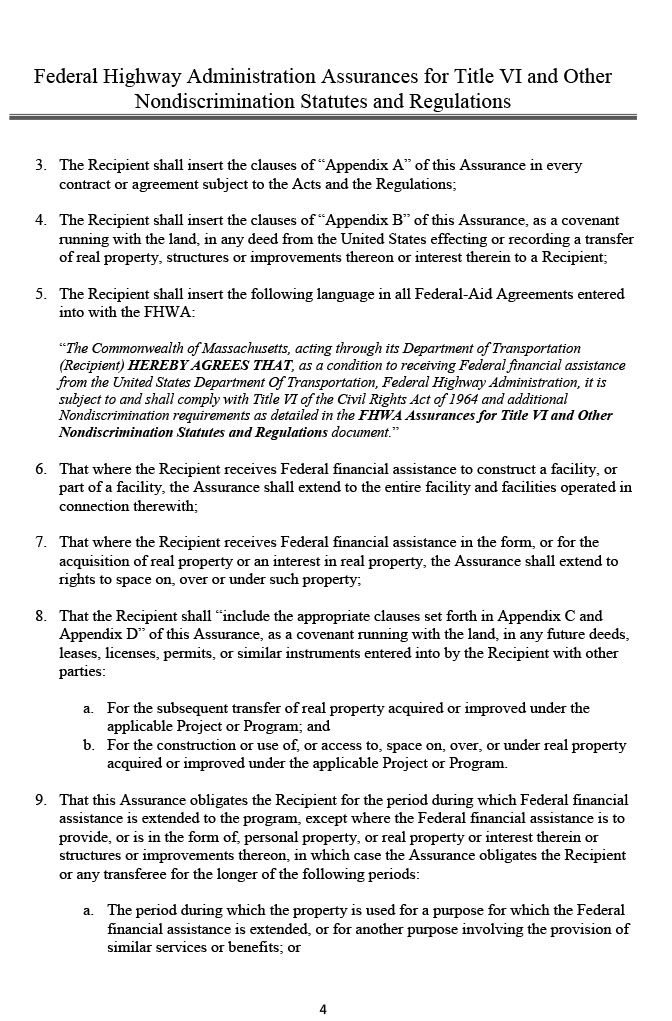

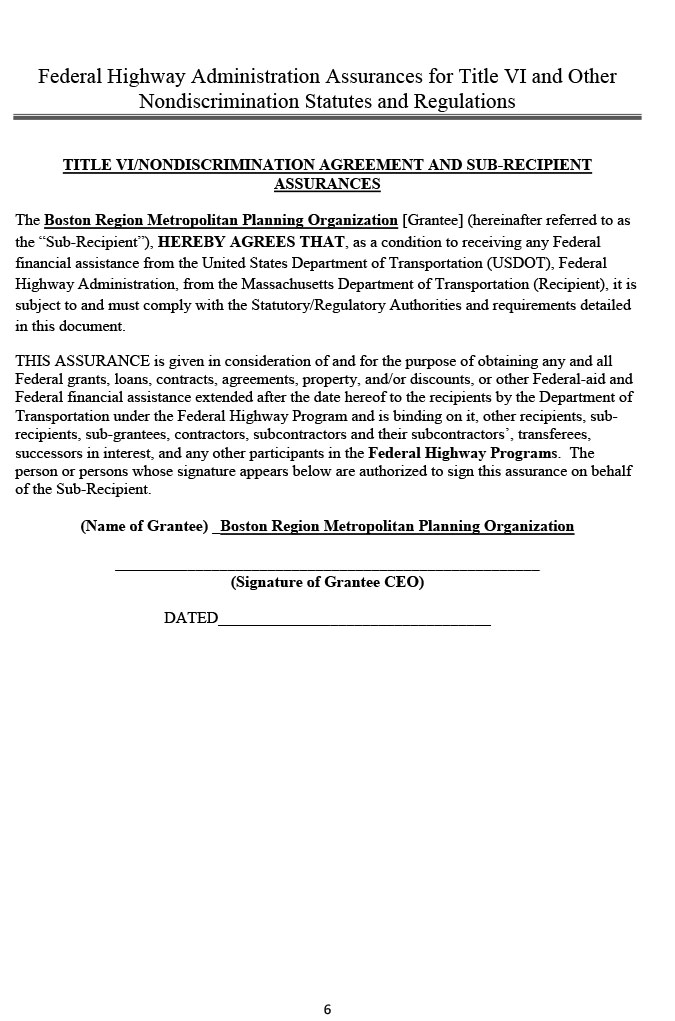
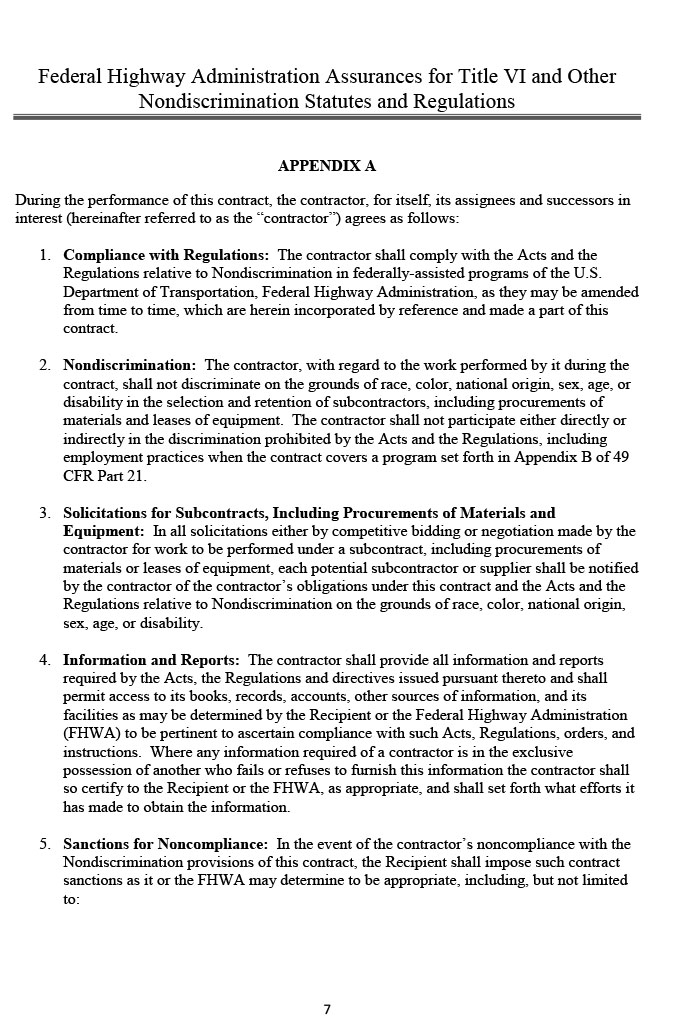
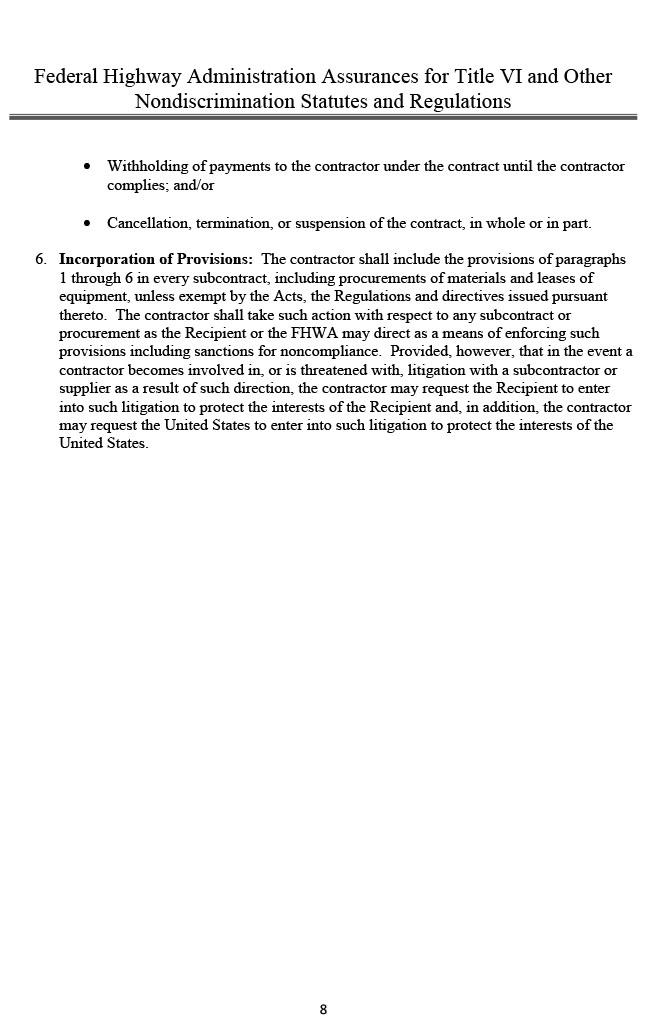
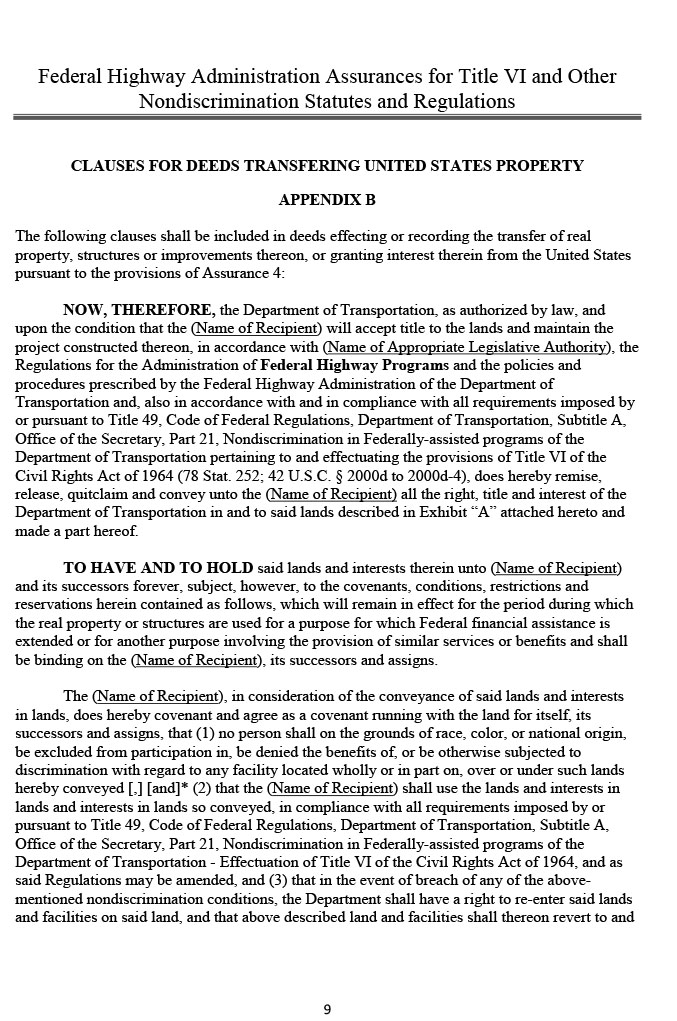

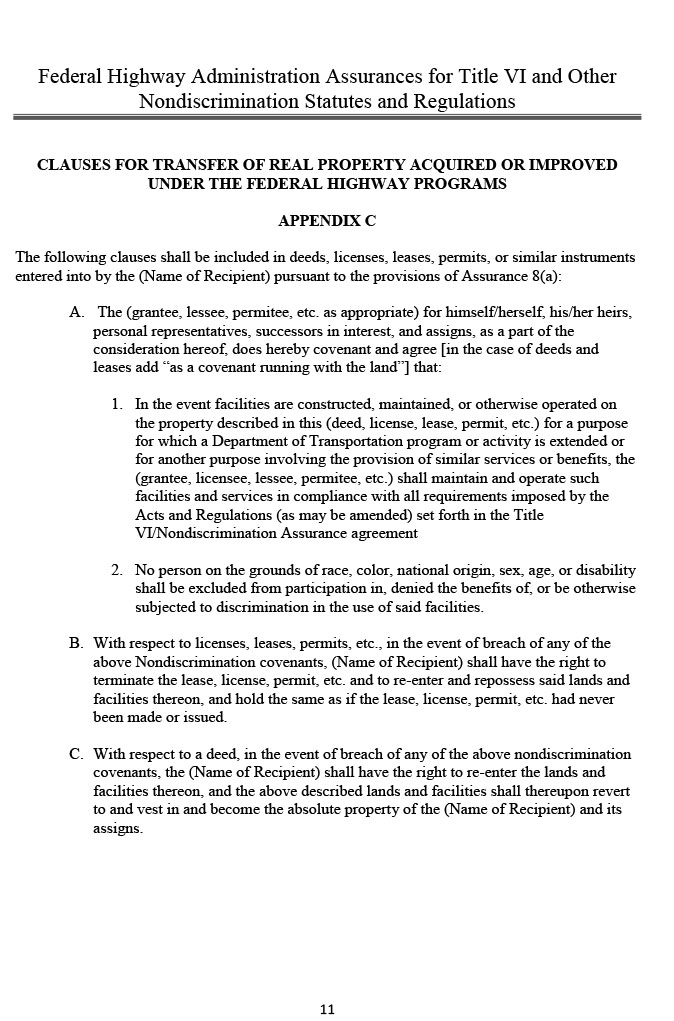

Title 49 CFR Section 21.9(d) requires recipients to provide information to the public regarding the recipient’s obligations under the United States Department of Transportation’s (US DOT) Title VI regulations and apprise members of the public of the protections against discrimination afforded to them by Title VI. The MPO notice, adapted from a MassDOT prototype, follows:
The Boston Region Metropolitan Planning Organization (MPO) operates its programs, services, and activities in compliance with federal nondiscrimination laws including Title VI of the Civil Rights Act of 1964 (Title VI), the Civil Rights Restoration Act of 1987, and related statutes and regulations. Title VI prohibits discrimination in federally assisted programs and requires that no person in the United States of America shall, on the grounds of race, color, or national origin (including limited English proficiency), be excluded from participation in, be denied the benefits of, or be otherwise subjected to discrimination under any program or activity receiving federal assistance. Related federal nondiscrimination laws administrated by the Federal Highway Administration, the Federal Transit Administration, or both prohibit discrimination on the basis of age, sex, and disability. These protected categories are contemplated within the Boston Region MPO’s Title VI Program consistent with federal interpretation and administration. Additionally, the Boston Region MPO provides meaningful access to its programs, services, and activities to individuals with limited English proficiency, in compliance with US Department of Transportation policy and guidance on federal Executive Order 13166.
The Boston Region MPO also complies with the Massachusetts Public Accommodation Law, M.G.L. c 272 §§ 92a, 98, 98a, prohibiting making any distinction, discrimination, or restriction in admission to or treatment in a place of public accommodation based on race, color, religious creed, national origin, sex, sexual orientation, disability, or ancestry. Likewise, the Boston Region MPO complies with the Governor's Executive Order 526, section 4 requiring all programs, activities, and services provided, performed, licensed, chartered, funded, regulated, or contracted for by the state shall be conducted without unlawful discrimination based on race, color, age, gender, ethnicity, sexual orientation, gender identity or expression, religion, creed, ancestry, national origin, disability, veteran's status (including Vietnam-era veterans), or background.
To request additional information regarding Title VI and related federal and state nondiscrimination obligations, please contact:
Title VI Specialist -
Boston Region MPO
10 Park Plaza, Suite 2150
Boston, MA 02116
617-973-7100
TTY: 617-973-7089
To file a complaint alleging a violation of Title VI or related federal nondiscrimination law, contact the Title VI Specialist (above) within 180 days of the alleged discriminatory conduct. To file a complaint alleging a violation of the state's Public Accommodation Law, contact the Massachusetts Commission Against Discrimination within 300 days of the alleged discriminatory conduct at:
Massachusetts Commission Against Discrimination (MCAD)
One Ashburton Place, 6th Floor
Boston, MA 02109
617-994-6000
TTY: 617-994-6196
English: If this information is needed in another language, please contact the Boston Region MPO’s Title VI Specialist at 617-973-7100.
(The above phrase will be repeated in four additional languages.)
Once MassDOT completes the translations, this statement will be posted on the MPO’s website along with the procedures for filing a complaint described in Appendix A of this report. This notice also will be posted at the entrance to the MPO office and a shorter version will be included in all public-outreach materials and on MPO meeting agendas. (A different version of this notice is currently posted on the MPO website, on outreach materials and MPO meeting agendas.)
1) |
|---|
2) |
3) |
Massachusetts Department of Transportation |
|
Massachusetts Bay Transportation Authority |
|
MBTA Advisory Board |
|
Massachusetts Port Authority |
|
Metropolitan Area Planning Council |
|
Regional Transportation Advisory Council |
|
City of Beverly |
1) |
2) |
City of Boston |
|
City of Everett |
|
City of Newton |
(Continued)
Program Member Endorsement (Cont’d.)
|
|---|
City of Somerville |
|
City of Woburn |
|
Town of Arlington |
|
Town of Bedford |
|
Town of Braintree |
|
Town of Framingham |
|
Town of Lexington |
|
Town of Medway |
|
Town of Norwood |
In order to comply with both FTA and FHWA requirements, the MPO has developed procedures for receiving, investigating, addressing, and tracking Title VI complaints, which are included in Appendix A. MassDOT is in the process of revising its complaint procedures. The MPO will adopt these procedures when they are finalized.
The MPO has not been the recipient of any Title VI complaints or lawsuits as defined by the Department of Justice and FTA, and no investigations have been initiated. However, FHWA includes those with disabilities as a protected class in its Title VI nondiscrimination definition. The following is pertinent information concerning an ADA complaint.
TABLE 1
Boston Region MPO FHWA Title VI Complaints
Date Filed with FHWA |
Summary of Allegations |
Status |
Findings |
|---|---|---|---|
March 28, 2012 |
MPO did not provide an auxiliary hearing aid; failed to address attitudinal issues regarding people with disabilities; failed to train staff; failed to provide an effective alternative accommodation; retaliated against complainants. |
Closed |
The Boston MPO did not violate the ADA and Section 504 by failing to provide reasonable accommodations for persons with disabilities. |
It is the policy of the MPO that people with limited English proficiency be neither discriminated against nor denied meaningful access to and participation in the programs and services provided by the MPO. The MPO has developed a Language Assistance Plan (LAP) to be sure that it employs appropriate strategies in assessing needs for language services and in implementing language services that provide meaningful access to the planning process and to published information without placing undue burdens on the MPO’s resources. The LAP, included in Appendix B, will be reviewed and revised periodically based on demographic changes, changes in the frequency of encounters with LEP persons, feedback from LEP groups, and changes in technology.
The MPO facilitates and encourages the involvement of minority, low-income, elderly, persons with disabilities, and LEP persons in its activities. As described in this chapter, it reaches out to these populations through its Public Participation Program (including its process for developing the metropolitan transportation certification documents), its Transportation Equity Program, its Coordinated Public Transit-Human Services Transportation planning, and the Access Advisory Committee to the MBTA.
The MPO utilizes a variety of approaches to providing for communication and consultation with interested parties and members of the public and is continually working to improve its outreach. This section will summarize the activities conducted and the outreach methods used by the MPO in implementing its public participation program. The MPO has recently updated its public participation plan (the Plan)—which describes all of the activities in its public participation program (the Program)—to be consistent with MassDOT’s plan, particularly regarding Title VI requirements. The Plan was revised following public outreach and research on MPO public participation needs and desires. The plan will be adopted in the fall, subsequent to a public-comment period on the draft and any changes that may need to be made as a result. The Draft Public Participation Plan is included in Appendix C.
The MPO conducts a varied and ongoing program for gathering information and views from all sectors of the public for its transportation planning and programming work. Some activities are focused specifically on the development of the certification documents. Others are ongoing and provide input year-round. All activities are open to the public and all MPO-sponsored activities are held at locations accessible for people with disabilities. The locations are well dispersed through the region, include environmental justice communities, and are almost always served by public transportation. In conducting its activities, the MPO strives to meet the needs of people requiring special services such as translation for LEP populations, American Sign Language interpreters, large-format printed materials, audiotapes, Braille materials, and escorts. Meeting materials are available in accessible formats and in other languages, upon request. Assistive-listening devices and microphones are provided at all public meetings.
Listed below are MPO activities that provide opportunities for the public to learn about metropolitan transportation planning and programming processes and provide input to decision making.
MPO outreach methods generally serve either or both of two purposes: 1) notification, and 2) provision of informational materials and reports. The MPO works to maintain state-of-the-practice capabilities in its methods.
Certification documents, other reports, informational materials, and notices are obtainable upon request in varied formats, including, Braille, and large-print. All documents are posted on the MPO website in PDF and HTML to provide accessibility for persons with disabilities. Members of the public may request meeting materials, in standard or accessible formats, by email, telephone, fax, or via US mail.
The MPO provides public notifications in a variety of ways, such as the MPO web site, news flashes, press releases for regional and local newspapers, and e-mailing flyers and notices in English, Spanish, Chinese, and Portuguese, to local officials, regional equity contacts, and other interested parties. The MPO’s newsletter, TRANSREPORT, publishes notices and discusses issues. Organizations providing support for persons with disabilities also forward MPO notices to their constituents in accessible formats.
Notices also are distributed via the MPO’s one-way listserve, “MPOinfo,” or the email groups of the MPO, Advisory Council, Transportation Equity Program, TIP contacts, and AACT members. MPOinfo has approximately 2,800 contacts and includes local officials, legislators, transit-service providers, councils on aging, chambers of commerce, regional employment boards, community development corporations, other social service organizations, members of the public who have attended meetings, and all other interested parties. Examples of MPO notices are included in Appendix E.
The MPO’s website posts notices of public outreach events and current activities and is an important method for distributing information to everyone with Internet access. It is a broad-based resource for people interested in MPO activities, notices, meeting minutes (including those of the MPO and the Advisory Council), reports, documents, and studies. It also hosts extensive transportation data about the region and other transportation planning information. Website users are invited to submit comments electronically through the “Meetings and Input” button on the homepage, the public participation page, and on each certification document’s page. The MPO also uses its web-based surveys to gather input on recent public outreach. A summary of outreach efforts is included in Appendix F.
The website is accessible to people who are visually impaired. MPO-produced documents use accessible fonts and formats that can be read by screen readers. The web site is equipped with Google Translates, software that translates posted text into many languages, including those most frequently spoken in the region. Vital documents are formally translated into Spanish, Chinese, and Portuguese and posted on the website. Documents currently defined as vital include:
The MPO’s bi-monthly newsletter, TRANSreport, provides information on the MPO planning process. Every issue reports on upcoming transportation-related public meetings and events, MPO activities, MPO and agency studies, and how to contact MPO staff with ideas, questions, and comments. Occasionally, issues include postage-paid survey inserts asking for input and ideas. TRANSreport is sent by mail and electronically to nearly 3,000 recipients. Issues are posted on the MPO website each month and later archived.
The MPO has an established process for considering the transportation needs and views of underserved constituencies, including communities of low-income, LEP, and minority residents. The MPO developed its Transportation Equity Program in order to have a systematic method of considering environmental justice in all of its transportation planning work. The program builds on the foundation of ongoing outreach concerning transportation needs and previous analyses of accessibility and mobility for low-income and minority communities in the Boston region. The findings from this work have been incorporated in the development of a number of MPO documents, including the 2010–2035 Long-Range Transportation Plan (LRTP), the 2000–2025 LRTP Addendum and Update, the 2004–2025 LRTP, the 2007–2030 LRTP (JOURNEY to 2030), the current LRTP (Paths to a Sustainable Region), and current Transportation Improvement Programs (TIPs) and Unified Planning Work Programs (UPWPs).
The MPO has adopted the following environmental justice policy, which it commits to:
The MPO’s Transportation Equity Program is composed of three key elements: community outreach, incorporation of environmental justice in the planning process, and analysis of the effects of planned transportation projects.
The MPO takes a proactive, grassroots approach to identifying and articulating environmental justice issues in the region. Methods include:
In carrying out these methods, the MPO has identified social service and community contacts involved in and knowledgeable about the transportation needs of environmental justice populations. These contacts include social service organizations, cultural and ethnic organizations, community development corporations, regional employment boards, civic groups, business and labor organizations, transportation advocates, environmental groups, councils on aging, independent living facilities, veteran’s organizations, and environmental justice/civil rights groups. The MPO is currently taking active steps to increase the number of contacts in its transportation equity outreach database.
Information about the transportation needs of minority, LEP, and low-income populations is primarily collected through one-on-one and small-group interviews and meetings with community contacts, surveys, and larger MPO focus groups or forums.
MPO staff seek to initiate interviews at the offices of representatives of community organizations to discuss transportation needs and burdens. In this way, the MPO facilitates the participation of some of the people best positioned to speak about the transportation needs of environmental justice areas, who might not otherwise have the time or financial resources to travel to meetings in a central location or to participate in public forums.
During these meetings, the MPO is able to both obtain information about the transportation needs of the area and inform participants about the MPO and the metropolitan planning process. Information and surveys are mailed to community contacts prior to these meetings to help participants prepare. These materials are also sent to those who are unable to schedule time for an interview.
A transportation equity survey is posted on the MPO website to help individuals identify transportation needs and problems in their communities. An “Invitation to Participate” (see Appendix G) along with the survey were sent to all of the transportation equity contacts. Comments obtained from the online survey are summarized and forwarded to appropriate agencies and communities. The MPO will continue this initiative and conduct additional surveys periodically.
Communication is ongoing, as MPO staff keep community organizations updated with information concerning MPO planning activities and continue to solicit information and views. The MPO also encourages contacts to participate in all scheduled MPO meetings and forums.
MPO staff interpret, summarize, and classify the needs identified by each participant in the outreach process as related to the LRTP, the TIP, the UPWP, service planning, and other planning processes. This information has been compiled and used as input to MPO work.
The MPO continues to consult with community partners involved in the MPO transportation equity process by providing a written summary of staff’s explanation of their needs for their review. They are informed of which classification(s) each of their needs has been given: LRTP, TIP, UPWP, service planning, or other. Communication is ongoing, as the MPO staff keep community partners updated with information. A summary of current and planned MPO activities (including MPO-sponsored meetings or meetings sponsored by other agencies, if known) that are related to the community’s needs may also be included.
The MPO will continue to expand its outreach to neighborhoods of concern and broaden its direct contacts with minority, LEP, elderly, and low-income residents in these communities. The goal is to identify specific community needs and to facilitate answers and possible actions by responsible agencies. Assistance in reaching some solutions will involve coordination with the Operations and Service Planning departments of the MBTA and the Office of Transportation Planning at MassDOT.
The MPO—in partnership with MAPC, the Human Service Transportation Office of the Executive Office of Health and Human Services, and the Statewide Mobility Manager (MassDOT Rail and Transit Division)—convened a Human Services and Equity in Transportation Forum in January 2014 to promote transportation services for populations who historically have had problems accessing, paying for, or receiving transportation that meets all of their trip-making needs. The target populations included seniors, minorities, people with low incomes, people with disabilities, those with limited English proficiency, veterans, and/or people living in zero-vehicle households in the MPO region. Approximately 70 people representing individuals and diverse groups, some of whom were new to public participation, attended the forum. The forum prospectus and invitation are included in Appendix H.
The MPO’s current Coordinated Public Transit Human-Services Transportation Plan (CHST Plan) provides guidance for improving transportation services for people with disabilities, elderly individuals, people with low incomes, and reverse-commuters in the Boston region; and it facilitates the coordination of public transit and human-services transportation resources. The original plan, completed in 2008 and updated in 2010, was developed in accordance with SAFETEA-LU, the federal legislation that funded surface transportation during that time period. The legislation established that recipients of funding from any of three Federal Transit Administration human-services transportation programs—Section 5310, for Elderly Individuals and Individuals with Disabilities, Section 5316, Job Access and Reverse Commute (JARC), and Section 5317, New Freedom (projects for individuals with disabilities that go beyond ADA requirements)—must certify that the projects to be funded have been selected from a locally developed, coordinated public transit–human services transportation plan, such as the CHST Plan. Section 5316 and Section 5317 grant programs were eliminated under MAP-21, the current surface transportation act, and the plan will be updated to reflect this. Information obtained from the forum mentioned above and from ongoing outreach and staff inventory of transit services also will be used to update the plan.
The Access Advisory Committee to the MBTA (AACT) is a consumer advocacy organization composed primarily of people with disabilities, seniors, and representatives of human service agencies. The MPO funds staff support for AACT. Working closely with the MBTA, AACT strives to ensure that the transportation system of the Boston region is accessible, in addition to being safe and efficient, as guaranteed by the Americans with Disabilities Act (ADA). AACT meets once a month to coordinate with MBTA officials and paratransit operators, to identify accessibility problems in the system, and to work on solutions. All meetings are open to the public. MPO staff coordinate the activities of AACT and notify AACT members of opportunities to participate in MPO planning.
The Regional Transportation Advisory Council (Advisory Council) is an independent group charged with providing public input on transportation planning to the Boston Region MPO. As a voting member of the MPO, the Advisory Council brings the perspectives of the public to the MPO for consideration as plans and programs are developed. Individuals are welcome to participate in all meetings of the Advisory Council, but membership is limited to public and private organizations and governmental units, including state agencies and municipalities. Entities are admitted to membership by vote of the existing members.
The Advisory Council is conducting outreach to make the membership more diverse. Agencies representing environmental-justice populations are offered an opportunity to participate in the Advisory Council during Transportation Equity outreach. This additional outreach to agencies has met with some success.
The MPO provides for non-discrimination in transit planning and programming through oversight and representation by its members; by following federal legislation and the 3C (continuing, cooperative, and comprehensive) transportation planning process; by reflecting the legislation in its objectives, policies, and plans; and by having non-discriminatory development and implementation processes for its LRTP, TIP, and UPWP.
Transportation equity/environmental justice is an integral part of the MPO transportation planning process. MPO policy promotes equitable sharing of the region’s transportation system benefits and burdens as well as participation in decision making. In 2010, the MPO adopted seven visions, each with an associated policy, that guide its planning processes. Two of the visions and their policies explain MPO’s commitment to promoting equity and accessibility for all:
4.2.2 Mobility
Vision
Policies
These policies were applied in assessing projects for inclusion in the LRTP, in developing MPO criteria for evaluation and selection of projects for the TIP; in selecting and defining studies for the UPWP, which includes MPO staff support for the MBTA’s Title VI reporting work; and in supporting the MPO’s ongoing transportation equity/environmental justice program.
The MPO is currently updating and recasting its visions and policies as goals and objectives with quantifiable targets to reflect national goals for performance-based decision making under MAP-21.
4.3 THE TRANSPORTATION PLANNING PROCESS
The 3C process in the Boston region is the responsibility of the MPO, which has established the following objectives for the process:
The MPO is responsible for carrying out and completing all transportation plans, programs, and conformity determinations required by federal and state laws and regulations through the 3C process. This includes preparation of the major certification documents: the LRTP, the UPWP, the TIP, and all required air quality analysis. The MPO also initiates studies to identify transportation needs and solutions, and programs financial resources for the region’s multimodal transportation system. The following is a brief description of each of the certification documents:
4.4. DEMOGRAPHIC PROFILE
For planning purposes, it is essential to understand who lives in the MPO region. Entities that receive federal funds are required to develop and use demographic profiles to ensure that the rights of people protected under various civil rights laws and presidential executive orders are not ignored during planning, selection, and implementation of various projects and services.
The FTA’s Title VI and environmental-justice circulars (FTA C4702.1B and FTA C 4703.1, respectively) require demographic profiles of the area encompassed by the MPO. The MPO uses these demographic data for several purposes: to identify geographic areas where minority populations exceed the MPO average; identify LEP populations, for the purpose of ascertaining potential transportation project benefits and burdens on low-income and minority populations, help evaluate TIP projects, and conduct outreach to engage low-income, minority, and LEP populations in the MPO planning process.
Except where otherwise noted, the following demographic profile was developed in 2012, based on the 2010 Census and the 2006-2010 American Community Survey (ACS).
4.4.1 Definitions
The Boston Region MPO has defined and continues to define a low-income threshold for an individual as a person living in a household whose median income is 60% or less than the median household income in the MPO area. Research indicates that this is in line with thresholds used by comparable MPOs. According to the 2010 ACS Summary File, the median MPO household income is $70,829, and the MPO’s low-income threshold is $42,497. This income threshold is used for all of the MPO’s Title VI reporting and for all of the environmental-justice analyses conducted for the LRTP and the TIP.
The Title VI circular defines a predominantly minority area as a geographic area, such as a neighborhood, census tract, or transportation analysis zone (TAZ ), where the proportion of minority persons residing in that area exceeds the average proportion of minority persons in the recipient’s service area.
For Title VI purposes, when identifying benefits and burdens of proposed transportation projects included in its LRTP and when evaluating TIP projects, the MPO has defined a minority TAZ as one whose minority population is greater than the overall MPO region’s average of 27.8%. For transportation equity (environmental justice) outreach purposes, the MPO continues to use the minority threshold of 50% or greater as it focuses on the areas of the MPO region that are most heavily defined as “minority.”
Federal regulations define LEP persons as those for whom English is not the primary language and who have a limited ability to read, write, speak, or understand English. It includes people who reported in the US census that they speak English ‘not well’ or ‘not at all.’ FTA, in its latest Title VI circular, includes those who speak English ‘less than well’ in its LEP definition. As such, FTA’s new definition doubles the number of people who are considered to be LEP.
4.4.2 Data Used for Title VI Purposes
Race and Income
Analysis reveals that the Boston Region MPO is home to approximately 3.2 million residents, 27.8% of whom are minorities. Table 2 shows the distribution of the population by race and the changes between 2000 and 2010. The total population increased by 3%. This growth is primarily a result of an approximately 34% increase in the minority population. The Asian population, which is the fastest-growing minority population, increased by 46%. The Hispanic population, which can include people in all racial groups, increased by 48%. Figure 1 shows the location of low-income and minority TAZs within the MPO.
Table 2
|
2000 Population |
2010 |
Change |
2000 |
2010 |
Change |
|---|---|---|---|---|---|---|
White |
2,491,060 |
2,413,522 |
-77,538 |
81.2% |
76.3% |
-3.1% |
Black/African American |
230,357 |
272,318 |
41,961 |
7.5 |
8.6 |
18.2 |
American Indian/Alaska Native |
6,079 |
7,620 |
1,541 |
0.2 |
0.2 |
25.3 |
Asian |
164,170 |
239,629 |
75,459 |
5.4 |
7.6% |
46.0% |
Native Hawaiian and other Pacific Islanders |
1,252 |
1,051 |
201 |
0.0 |
0.0 |
-16.1 |
Other |
98,157 |
142,689 |
44,532 |
3.2 |
4.5 |
45.4 |
Two or More Races |
75,319 |
84,883 |
9,564 |
2.5 |
2.7 |
12.7 |
Total |
3,066,394 |
3,161,712 |
95,318 |
100.0% |
100.0% |
3.1% |
Hispanic |
195,598 |
289,034 |
93,436 |
6.4% |
9.1% |
47.8% |
Minority* |
657,102 |
878,118 |
221,016 |
21.4 |
27.8 |
33.6 |
*Includes Hispanic Caucasians, and all non-white populations.
Figure 1 Low-income and Minority Populations
Low-income and minority thresholds were used to identify low-income and/or minority TAZs. (Although Title VI relates to race, color, and national origin, income also is used as a criterion for some Title VI programs.)
Language
The LEP analysis was recently updated using 2012 ACS data. The U S Department of Transportation and FHWA define an LEP person as one who speaks English “not well” or “not at all”. According to the 2012 ACS, 5.3% of the MPO population who are five years of age and older (150,610 of the MPO area population of 2,865,258) are LEP. The largest proportion of LEP persons in the MPO area speak Spanish (39.5%), followed by Chinese (16.1%), and Portuguese (12.7%). Altogether, LEP speakers of these three languages represent over two-thirds (68.3%) of the MPO’s LEP population over five years of age. LEP populations meeting the U. S. Department of Transportation definition of LEP “safe harbor” thresholds (5% of the population or 1,000 individuals, whichever is less) include speakers of the languages shown in Table 3.
|
|
Percent LEP Population |
Percent MPO Population |
|---|---|---|---|
Spanish |
57,479 |
39.5% |
2.1% |
Chinese |
24,288 |
16.1 |
0.8 |
Portuguese |
19,167 |
12.7 |
0.7 |
Vietnamese |
9,562 |
6.3 |
0.3 |
French Creole |
8,284 |
5.5 |
0.2 |
Russian |
5,379 |
3.6 |
0.2 |
Italian |
3,151 |
2.6 |
0.1 |
Arabic |
2,717 |
1.8 |
0.1 |
Greek |
2,065 |
1.4 |
0.1 |
Korean |
2,020 |
1.3 |
0.1 |
French |
1,654 |
1.1 |
0.1 |
Mon Khmer, Cambodian |
1,593 |
1.1 |
0.1 |
Albanian |
1,245 |
0.8 |
0.0 |
Other languages |
10,132 |
6.7 |
0.4 |
Total |
150,610 |
100.0% |
5.3% |
*Spoken by the population five years of age and older.
In its current Title VI circular, FTA has broadened the definition of LEP to include individuals who speaks English ‘less than very well’ in addition to those who speak English ‘not at all” and not well.’ This definition doubles the number of LEP individuals in the MPO, although, for the most part, the languages they speak (see Table 4) are the same ones that are identified using the more conservative definition (Table 3).
|
|
Percent LEP Population |
Percent MPO Population |
|---|---|---|---|
Spanish |
103,147 |
34.2% |
3.6% |
Chinese |
43,614 |
14.4 |
1.5 |
Portuguese |
37,400 |
12.4 |
1.3 |
French Creole |
19,061 |
6.3 |
0.7 |
Vietnamese |
16,186 |
5.4 |
0.6 |
Russian |
12,281 |
4.1 |
0.4 |
Italian |
7,956 |
2.6 |
0.3 |
Arabic |
7,534 |
2.5 |
0.3 |
French |
6,302 |
2.1 |
0.2 |
Korean |
5,296 |
1.8 |
0.2 |
Greek |
4,315 |
1.4 |
0.2 |
Mon-Khmer, Cambodian |
2,915 |
1.0 |
0.1 |
Albanian |
2,888 |
1.0 |
0.1 |
Japanese |
2,416 |
0.8 |
0.1 |
Armenian |
1,856 |
0.6 |
0.1 |
Polish |
1,821 |
0.6 |
0.1 |
Hindi |
1,768 |
0.6 |
0.1 |
Gujarati |
1,607 |
0.5 |
0.1 |
Amharic |
1,402 |
0.5 |
0.0 |
Punjabi |
1,398 |
0.5 |
0.0 |
Persian |
1,247 |
0.4 |
0.0 |
Tamil |
1,140 |
0.4 |
0.0 |
Bengali |
1,076 |
0.4 |
0.0 |
Tagalog |
1,057 |
0.4 |
0.0 |
Other Languages |
16,195 |
5.4 |
0.6 |
Total |
301,878 |
100.0% |
10.5% |
*According to the FTA LEP Definition. **Spoken by the population five years of age and older.
Appendix B, the MPO’s Language Assistance Plan, shows maps with LEP information according to FTA’s LEP definition. The MPO refers to these maps for outreach purposes.
Data supporting the figures will be used for Title VI purposes and to determine benefits and burdens of projects that are included in the MPO’s LRTP and TIP.
Age
The MPO population that is 65 years of age and older is growing slightly faster than the overall population. The general MPO population increased by 3.1% between 2000 and 2010, while the 65-and-older population increased by 4%. Approximately 13.3% of the MPO population belonged to this age group in 2010.
4.4.3. Transportation Equity (Environmental Justice) Outreach to Underserved Populations
Demographic data are also used to reach out to and inform low-income, minority, and LEP populations about MPO activities and documents. The threshold for defining low-income areas as having a median household income less than or equal to 60% of the MPO’s median household income is used to determine which TAZs are low-income, and this threshold is also used for outreach purposes. However, as discussed above, for outreach to minority areas, the MPO continues to use the 50% minority threshold as it helps staff to focus its outreach efforts on the most heavily minority areas of the MPO region.
For outreach purposes, the MPO has identified what it calls areas of concern, which are clusters of TAZs that meet the MPO’s income or minority criteria. In general, the TAZs in these clusters have to have at least 200 low-income or minority residents each. TAZs with populations that meet the thresholds and that contain group living quarters with changing populations (for example, prisons and college dorms) but small numbers of households, are excluded.
Analysis indicates that within the MPO region, there are areas of concern in 15 municipalities and 13 Boston neighborhoods. Municipalities containing areas of concern represent 45% of the MPO’s population, 73% of the MPO’s minority population, and 82% of the LEP population (USDOT definition). Identified areas of concern represent 20% of the MPO’s total population, 49% of the minority population, and 54% of the LEP population (USDOT definition). These areas are shown in Figure 2.
The outreach component of the Transportation Equity Program (discussed in Chapter 2) is a major source of information concerning the transportation issues and needs confronting low-income, LEP, and minority residents in the MPO region. MPO staff interpret the needs identified by each community and classify them as related to the LRTP, the TIP, the UPWP, service planning, or another planning process. The LRTP-related needs are a focus of the LRTP needs
Environmental Justice Areas of Concern

assessment. The TIP-related needs are identified in the TIP project information forms and in the TIP itself, and they inform the “community impacts” criteria category in the TIP ratings matrix. The UPWP-related needs are considered by the MPO staff and the MPO’s UPWP Subcommittee to inform decisions about possible new MPO studies. Transit service planning needs are forwarded to the MBTA for consideration during development of its biennial service plan. Other needs are referred to appropriate entities.
Additional information about the transportation needs of minority, LEP, low-income, elderly, and persons with disabilities is collected in the MPO’s general public-participation program and its Coordinated Human-Services Transportation planning. This information is integrated with the findings of the transportation equity outreach, and it is used to inform MPO planning activities.
The potential impact of a proposed project in environmental justice areas is considered in the Plan, TIP, and UPWP project-ranking processes. Environmental justice analyses for the Plan and TIP are funded in the UPWP. In these analyses, MPO staff give projects positive or negative ratings on environmental justice criteria based on the estimated benefit or burden to environmental justice areas. The MPO considers these ratings when deciding what projects should receive funding. Environmental justice is a factor that the MPO also considers when determining which studies should be included in the UPWP.
The MPO performs a systemwide analysis of benefits and burdens for three different scenarios: existing conditions, the set of projects that are currently funded by the MPO, and the set of projects recommended in the Plan. The analysis focuses on mobility, accessibility, and emissions for communities with a high proportion of low-income and minority residents. Chapter 9 of Paths to a Sustainable Region details the results of the analysis conducted for that Plan; this chapter is provided in Appendix L. (The upcoming LRTP will include this type of analysis as well.)
The MPO used three categories of measures in the analysis:
These analyses, based on TAZs throughout the region, are conducted to evaluate the impact of proposed Plan projects on both environmental justice areas and non-environmental justice areas.
The results of the accessibility, mobility, and environmental analyses are used to understand how a proposed set of projects might affect the environmental justice areas as compared with the non-environmental-justice areas in the region. The analysis of the projects included in Paths to a Sustainable Region showed that the projects recommended in the final LRTP benefit environmental justice areas more overall than they benefit non-environmental-justice areas. .
The TIP is developed with consideration of the impacts of the proposed projects on MPO environmental justice TAZs. The MPO uses a set of evaluation criteria to evaluate each target (discretionary) project proposed for inclusion in the TIP. There are 35 criteria, three of which are specific to environmental justice. All projects are rated as to whether the project benefits or creates burdens for environmental justice TAZs. The following values are used to rate projects in or contiguous to environmental justice TAZs Projects in or contiguous to environmental justice TAZs receive:
Improves access to transit for an Environmental Justice population (up to three points:
Design is consistent with complete streets policies in an environmental justice area (up to four points)
Addresses an MPO identified environmental justice transportation issue (up to three points)
The MPO is committed to transportation equity/environmental justice and continues to seek equitable distribution of benefits and burdens in the transportation system through ongoing compliance with its own policies and consideration of environmental justice factors through its evaluations and input from the public.
Staff analyzed the Federal Fiscal Years 2012-2017 TIP target program to determine how many evaluated and funded projects are located within one-half mile of an EJ TAZ. Table 5 shows that EJ TAZs fare well during the five-year period covered by this TIP. These TAZs encompass 36% of the MPO’s total population and 71% of the minority population. Meanwhile, more than half of the projects evaluated for funding are in or near EJ TAZs, as are 59% of the projects targeted for funding. The anticipated cost of funded projects is $50 per capita for the MPO; $88 per capita for EJ TAZs; and $29 per capita for non-EJ TAZs. Evaluated and funded project information also is presented in Figures 3 and 4.
MPO Total |
Environ-mental |
Pct. MPO Total in EJ TAZs |
Non-EJ |
Pct. MPO Total in Non-EJ TAZs |
|
|---|---|---|---|---|---|
Transportation Analysis Zones (TAZs) |
1943 |
675 |
35% |
1268 |
65% |
Population |
3,161,534 |
1,146,334 |
36 |
2,015,200 |
64 |
Minority Population |
878,120 |
622,021 |
71 |
256,099 |
29 |
Number of Evaluated Projects |
58 |
30 |
52 |
28 |
48 |
Number of Funded Projects (MPO Target) |
22 |
13 |
59 |
9 |
41 |
Projects not Funded |
28 |
12 |
43 |
16 |
57 |
Evaluated Projects |
$388,227,468 |
$224,850,374 |
5%8 |
$163,377,094 |
425 |
Funded Projects (MPO Target) |
158,060,585 |
98,896,856 |
63 |
59,163,729 |
37 |
Projects Not Funded |
200,299,854 |
100,923,400 |
50 |
99,376,455 |
50 |
Funded Project Dollars (MPO Target) per Capita |
50 |
86 |
-- |
29 |
- |
Not Funded Project Dollars per Capita |
63 |
88 |
-- |
49 |
|
Evaluated Projects Dollars per Capita |
123 |
196 |
-- |
81 |
Federal Fiscal Years 2012-2017 TIP Project Information
Federal Fiscal Years 2012-2017 TIP Project Costs
Appendix A
Appendix A is titled “Complaint Procedures.” This appendix includes a description of the Boston Region MPO’s Title VI and Civil Rights Nondiscrimination Complaint Procedure, and complaint forms.
Appendix B—Boston Region MPO Language-Assistance Plan (February 2014)
On August 11, 2000, President Clinton signed Executive Order 13166, “Improving Access to Services for Persons with Limited English Proficiency.” This Executive Order requires federal agencies to examine the services they provide, identify those whose potential users could include persons with limited English proficiency, and develop and implement a system to provide those services in such a way that LEP persons have meaningful access to them.
Title VI of the Civil Rights Act of 1964 prohibits discrimination on the basis of national origin and, in consideration of Executive Order 13166, requires that recipients of federal funds assess and address the needs of LEP individuals seeking assistance. The US Department of Transportation (USDOT) developed guidance titled Policy Guidance Concerning Recipients’ Responsibilities to Limited English Proficient Persons to ensure that people in the United States are not excluded from participation in DOT-assisted programs and activities because they face challenges communicating in English. This guidance clarifies funding recipients’ responsibilities to provide meaningful access for LEP people under existing law by describing the factors recipients should consider in fulfilling their responsibilities to LEP persons.
The Boston Region Metropolitan Planning Organization’s Language-Assistance Plan has been developed based on DOT guidance, which identifies the following four factors to consider when determining reasonable steps for ensuring that LEP people have meaningful access3 :
It is the policy of the Boston Region MPO that people with limited English proficiency be neither discriminated against nor denied meaningful access to and participation in the programs and services provided by the MPO. The MPO has developed this plan ensure that it employs appropriate strategies to assess needs for language services; and to implement language services that provide meaningful access to the planning process and to published information without placing undue burdens on the MPO’s resources.
The MPO used the aforementioned four factors identified by USDOT to determine reasonable steps for providing meaningful access to the MPO’s activities for people LEP. These factors are described below.
According to the USDOT’s definition, people are considered to have LEP if they speak English “not well” or “not at all.” However, FTA’s definition includes those who speak English “less than very well”. FTA’s definition is used in this analysis as it sets the upper bounds on the LEP population.
Data from the 2008-2012 five-year ACS public-use micro data sample (PUMS)4 were used to analyze the number of LEP persons five years of age and older in the Boston Region MPO. According to the ACS Summary file, 10.5% of this population (301,878 of the MPO area population of 2,865,258 who are five years of age and older) in the MPO region are considered to have limited English proficiency as they speak English “less than very well.” The largest proportion of LEP persons speak Spanish (34.2%), followed by Chinese (14.4%), and Portuguese (12.4%). Altogether, LEP speakers of these three languages represent almost two-thirds (61%) of the MPO’s LEP population five years old and older. LEP populations meeting the US Department of Transportation’s definition of LEP “safe harbor” thresholds (5% of the population or 1,000 individuals, whichever is less) include speakers of the languages in the following table. Individuals who do not speak English as their primary language and who have a limited ability to read, write, speak, or understand English may be entitled to language assistance under Title VI of the Civil Rights Act of 1964. Figures B1-B-7 (at the end of the appendix) show the distribution of those with limited-English proficiency and the distribution of speakers of the top six languages.
Non-English Safe Harbor Languages in the Boston Region MPOa
|
|
|
|
|---|---|---|---|
Spanish |
103,147 |
34.2% |
3.6% |
Chinese |
43,614 |
14.4 |
1.5 |
Portuguese |
37,400 |
12.4 |
1.3 |
French Creole |
19,061 |
6.3 |
0.7 |
Vietnamese |
16,186 |
5.4 |
0.6 |
Russian |
12,281 |
4.1 |
0.4 |
Italian |
7,956 |
2.6 |
0.3 |
Arabic |
7,534 |
2.5 |
0.3 |
French |
6,302 |
2.1 |
0.2 |
Korean |
5,296 |
1.8 |
0.2 |
Greek |
4,315 |
1.4 |
0.2 |
Mon-Khmer, Cambodian |
2,915 |
1.0 |
0.1 |
Albanian |
2,888 |
1.0 |
0.1 |
Japanese |
2,416 |
0.8 |
0.1 |
Armenian |
1,856 |
0.6 |
0.1 |
Polish |
1,821 |
0.6 |
0.1 |
Hindi |
1,768 |
0.6 |
0.1 |
Gujarati |
1,607 |
0.5 |
0.1 |
Amharic |
1,402 |
0.5 |
0.0 |
Punjabi |
1,398 |
0.5 |
0.0 |
Persian |
1,247 |
0.4 |
0.0 |
Tamil |
1,140 |
0.4 |
0.0 |
Bengali |
1,076 |
0.4 |
0.0 |
Tagalog |
1,057 |
0.4 |
0.0 |
Other Languages |
16,195 |
5.4 |
0.6 |
Total |
301,878 |
100.0% |
10.5% |
a Population that is five years of age and older.
b Includes those who self-identify as speaking English “less than very well,” “not well,” and “not at all.”
The MPO has infrequent and unpredictable contact with LEP individuals, partly because of the nature of MPO programs and activities. The most frequent avenues for contact are the MPO website, flyers, and other announcements that are emailed to individuals and organizations, identified through the MPO’s transportation equity program.
Other likely occasions for contact with non-English-speaking people are events like the MPO’s public workshops, open houses, and transportation equity forums. The MPO has been making a concerted effort to identify and reach out to minority and LEP populations. Demographic maps are used to identify areas in which public outreach meetings may be needed to include LEP populations and determine the languages into which outreach materials might be translated.
To date, language interpreters have not been requested for any MPO meetings or events. The MPO will continue to monitor such requests to help inform future needs.
The MPO plans, and programs capital transportation funds for future transportation projects in the region. While the MPO is not a direct transportation-service provider, and denial or delay of access to the MPO’s programs and activities would not have immediate or life-threatening implications for a person with LEP, transportation improvements resulting from the MPO’s activities have an impact on the mobility and quality of life for all residents.
Input from all stakeholders is critical to the MPO’s process, so it invests considerable effort in inclusive public outreach. The MPO encourages and helps the public to understand the transportation planning process and provides many opportunities for the public to participate and comment through a variety of activities, which are described fully in the MPO's Public Participation Plan.
Three major documents and their related planning initiatives—an annual Unified Planning Work Program, a four-year Transportation Improvement Program, and a 20-plus-year Long-Range Transportation Plan—also are important to the planning process, and offer opportunities for the public to comment on the use of federal funds that are programmed
As a result of the regional transportation planning process, selected projects receive approval for federal funding and progress through project planning, design, and construction under the responsibility of local jurisdictions or state transportation agencies. These state and local organizations have their own policies in place to ensure opportunities for people with LEP to participate in the process that shapes where, how, and when a specific project is implemented.
Some MPO documents and outreach materials are of vital importance to the public for understanding and participating in the transportation planning process. To accommodate LEP individuals, the MPO routinely translates these into the three languages most widely spoken by LEP individuals: Spanish, Chinese, and Portuguese. Documents currently identified as vital are:
The cost of providing interpreters at meetings is high; however, although the MPO has advertised the availability of interpreters, none have been requested to date. The MPO’s current policy is to provide these services whenever they are requested.
Based on the number and type of meetings for which written materials need to be translated, the MPO has budgeted sufficient funds to translate vital documents into the three languages most widely spoken by LEP individuals (see section B.3.2 below). The budget also includes sufficient funds to translate documents into other languages, as needed, for public outreach or to accommodate requests. To date, only a few individuals have made such requests.
Although the MPO has been able to provide services with existing resources thus far, the region is dynamic and continues to attract diverse ethnic and cultural populations. Therefore, the MPO will continue to monitor the need for translating publications and documents and for interpretation at meetings/events, based on factors one through three of the four-factor analysis and the number of requests received, and will determine whether the current policy needs to be adjusted because of resource constraints.
Notices for all MPO meetings state that translation services (including American Sign Language) are available at public meetings upon request. The current number of residents with limited English proficiency in the Boston region, and their infrequent interaction with the MPO, have resulted in the MPO’s rarely needing to provide language services. However, engaging the diverse population within the region is important, and the MPO takes the following measures to ensure meaningful access for the LEP population in the Boston region.
Key staff at the MPO office will utilize language identification “I speak” cards, developed by the US Census Bureau, when first encountering an LEP individual. On these cards appears the phrase “Mark this box if you read or speak [name of language]” in 38 different languages. Government and non-government agencies use these cards to identify the primary language of LEP individuals when face to face. To assist LEP individuals who might come to the MPO offices, language identification cards are available at the front desk, along with a list of staff members who are able and willing to serve as translators.
MPO staff that interact frequently with the public are familiar with the resources necessary to engage translators for meetings and use phone translators for one-on-one communication.
The MPO’s public involvement activities seek to promote respect, provide opportunities for meaningful involvement, be responsive to participants, provide a predictable process, open new avenues of communication, and attract new constituencies. The MPO provides press releases for its workshops on the LRTP and TIP. Language interpreters will be provided upon request at public meetings. Press releases announcing public review of the certification documents or their amendments are placed in the El Mundo and La Semana (the region’s two major Spanish-language newspapers).
The MPO’s Transportation Equity Program includes outreach to areas with relatively high concentrations of people who may be limited in their ability to speak or understand English. The MPO regularly contacts representatives of community ethnic and cultural organizations as part of the transportation equity outreach process. These individuals have been resources for identifying the needs of LEP populations and informing their communities about MPO programs and activities.
As indicated above, the MPO currently translates vital documents into Spanish, Chinese, and Portuguese, the three primary non-English languages in the region. Material is translated into other languages, as needed, when outreach meetings or forums are conducted in areas where MPO demographic maps indicate the presence of LEP populations.
MPO staff that interact frequently with the public are familiar with the resources necessary to obtain written translations of materials whenever necessary.
Google Translates is available on the MPO website, which contains considerable information on the regional transportation-planning process and the MPO’s programs and activities. Google Translates allows visitors to translate any page of text into the following additional languages: simplified and traditional Chinese, French, Italian, Portuguese, Russian, Spanish, and Vietnamese. To meet accessibility requirements for individuals with low or no vision, MPO documents are posted as PDF files and in HTML, which can be read using Google Translates.
Vital documents posted on the website are formally translated into Spanish, Chinese, and Portuguese.
The MPO will monitor the region’s changing language needs and update language-assistance services when appropriate. The MPO will track the number of requests (by language) for language assistance in its programs and activities and will look for ways to expand participation of LEP people. If the need for language-assistance services warrants, the MPO will revise its language-access plan.
The CTPS Nondiscrimination Handbook describes a training program that is being developed to train MPO staff about the treatment and accommodation of those protected under various civil rights laws and regulations, including minority and LEP individuals. This training will be developed and implemented in collaboration with the MassDOT Office of Diversity and Civil Rights, the Massachusetts Office of Diversity, the Massachusetts Commission for the Deaf and Hard of Hearing, and the Massachusetts Commission for the Blind. Although key staff already know how to provide timely and reasonable language assistance to LEP populations, future training for all staff will include this information.
For face-to-face interactions with LEP individuals, training will include language identification “I speak” cards, developed by the US Census Bureau. The phrase “Mark this box if you read or speak [name of language]” appears on these cards in 38 different languages. These are kept at the front desk for use by the receptionist or any other staff member who needs to identify the primary language of an LEP individual. Also available is a list of staff members who speak languages other than English and are able and willing to serve as translators. Staff that have most frequent contact with the public through MPO and other public meetings, are taught to use phone translation services, how to engage translators for meetings, and obtain written translations.
The CTPS Nondiscrimination Handbook provides MPO staff with information about all types of accommodations and establishes protocols for using them.
Figure B-1 Populations with Limited-English Proficiency

Figure B-2 Limited-English Proficiency: Spanish Speakers
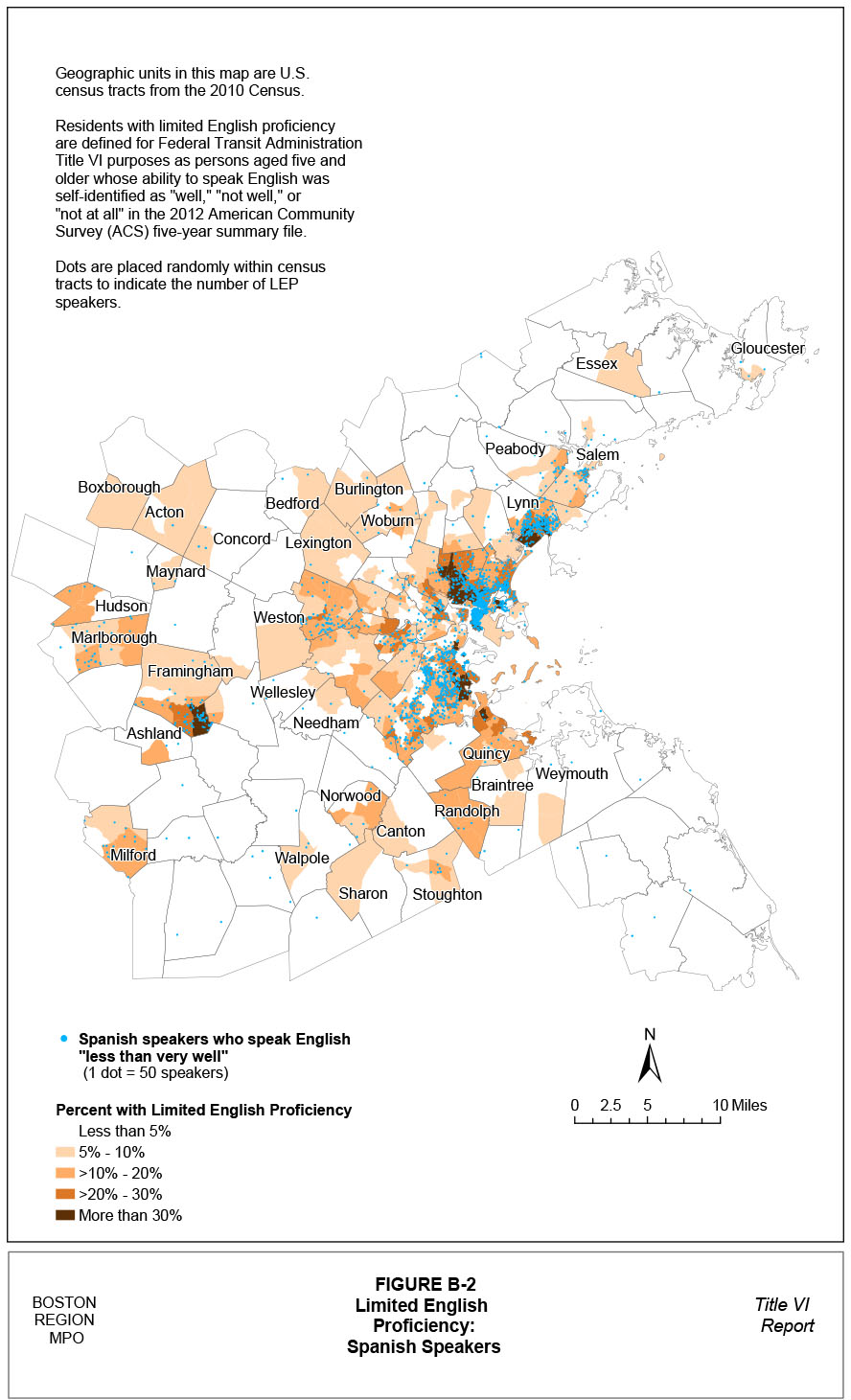
Figure B-3 Limited-English Proficiency: Chinese Speakers
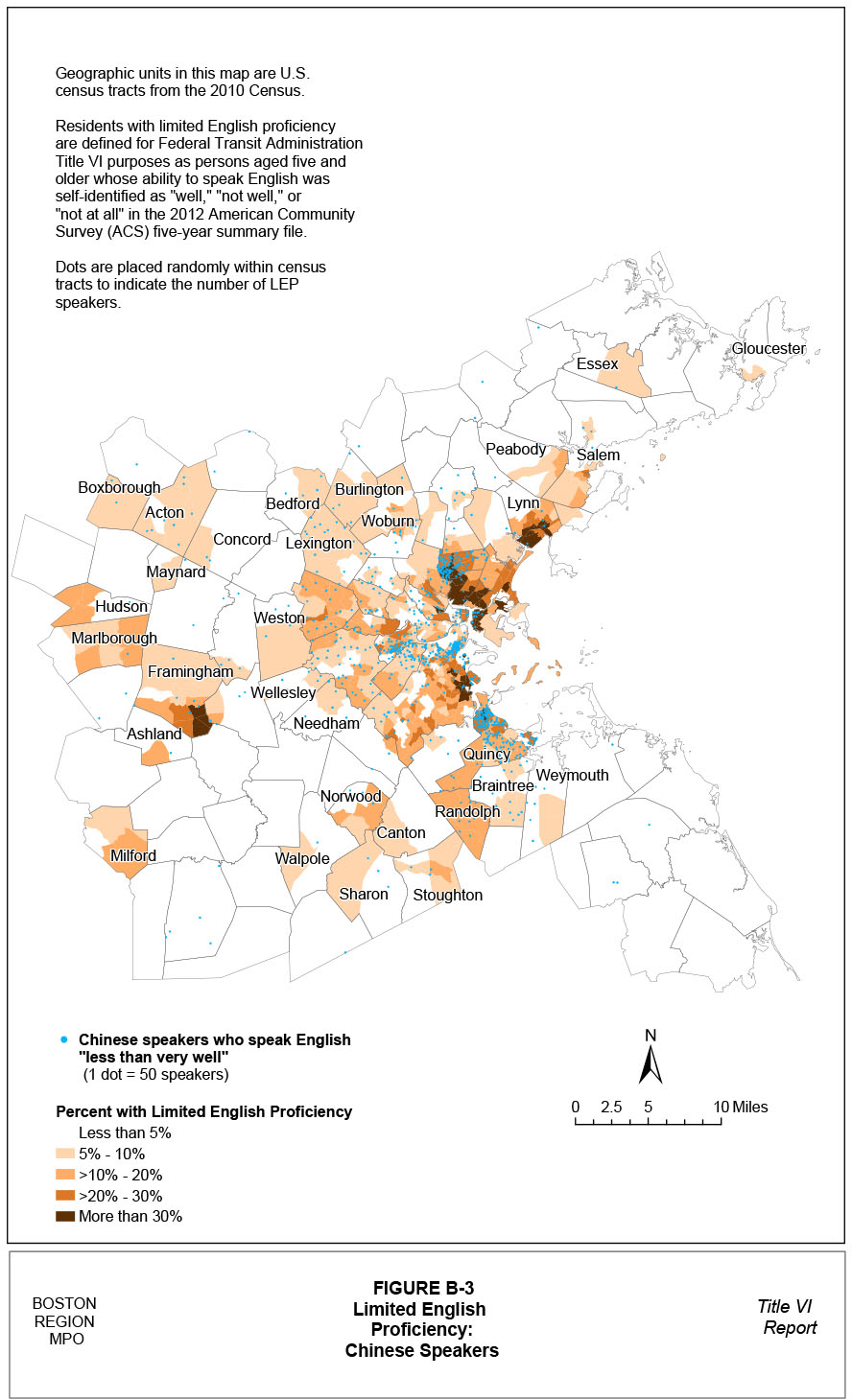
Figure B-4 Limited-English Proficiency: Portuguese Speakers

Figure B-5 Limited-English Proficiency: French Creole Speakers

Figure B-6 Limited-English Proficiency: Vietnamese Speakers
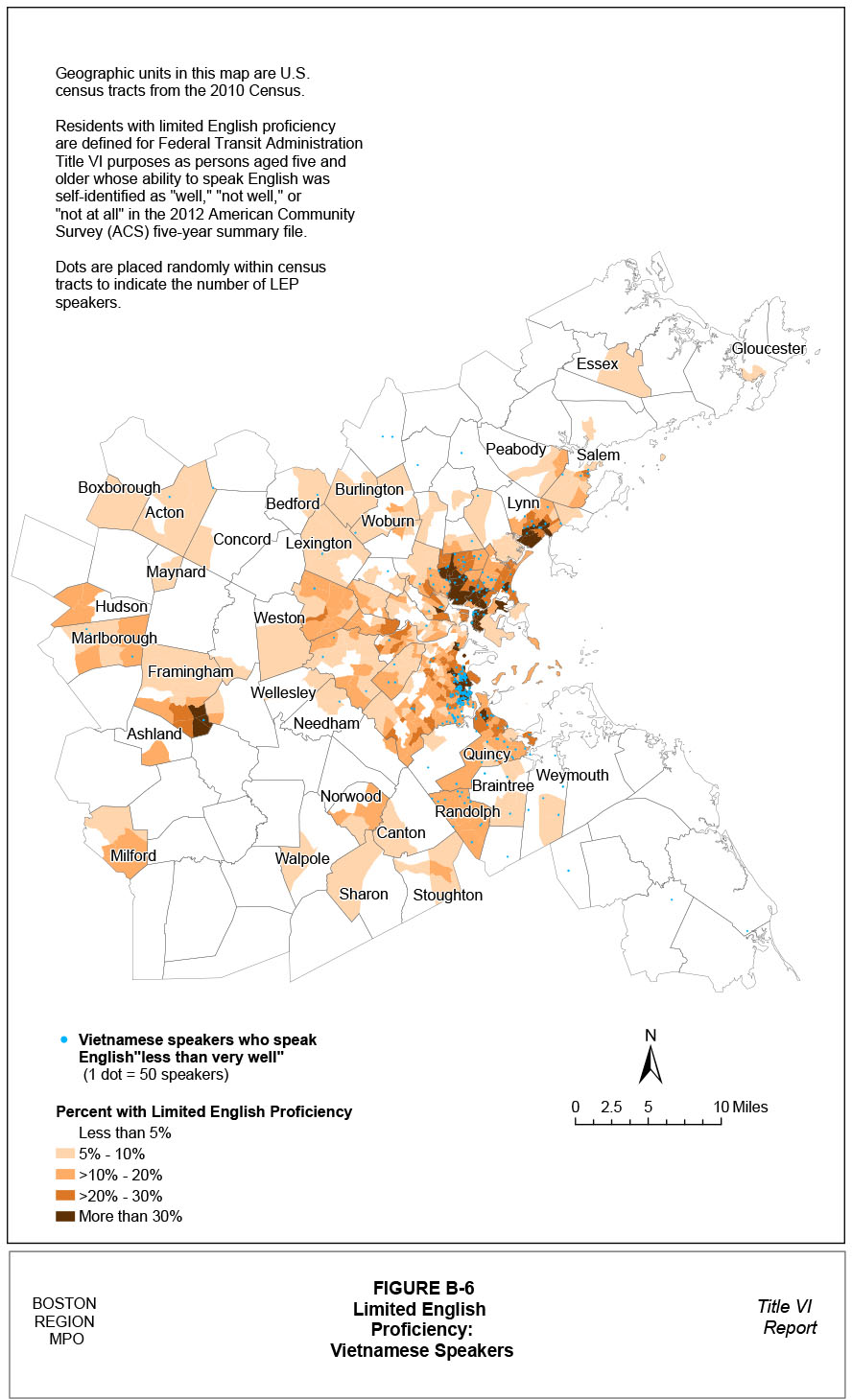
Figure B-7 Limited-English Proficiency: Russian Speakers
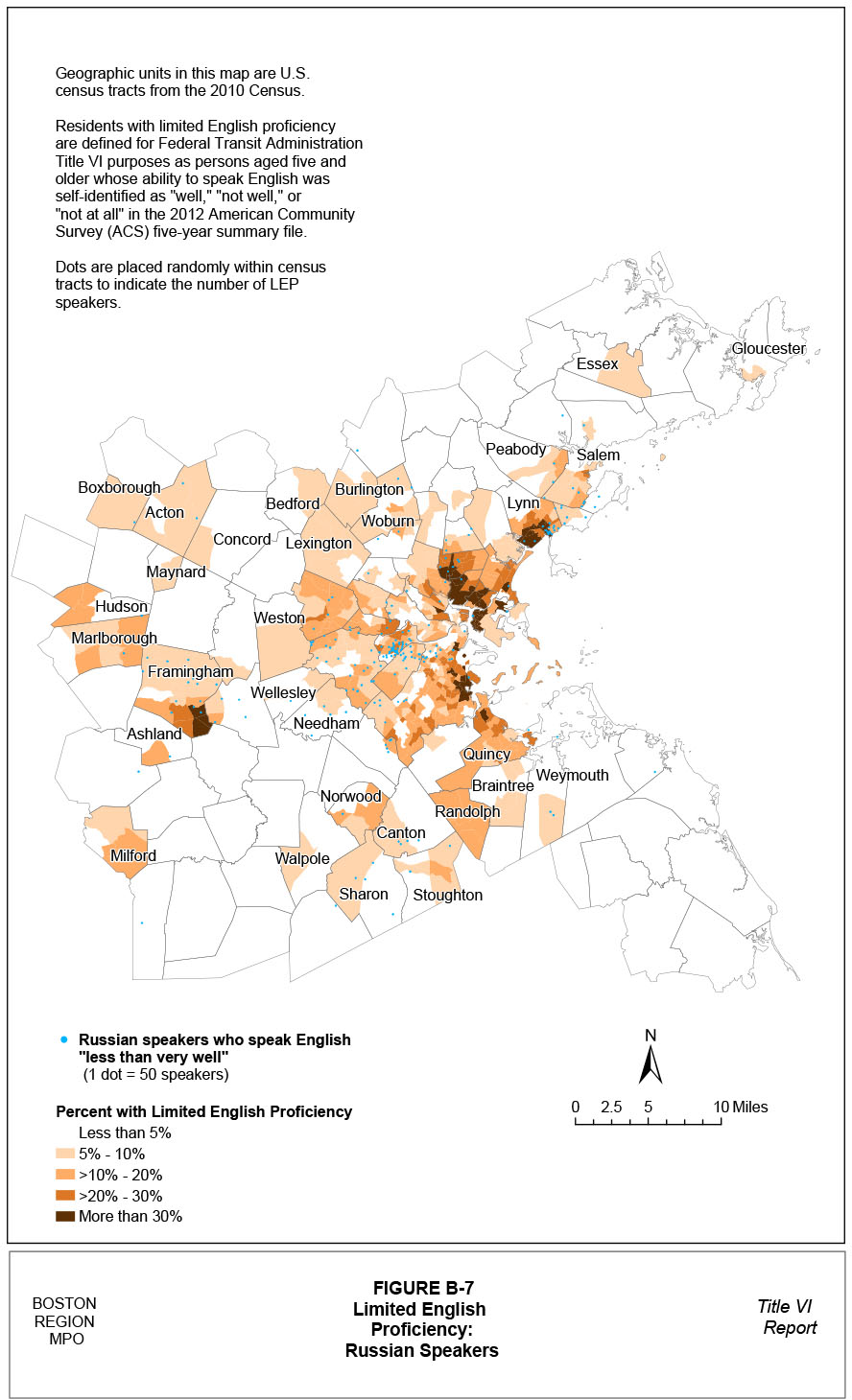
3 FTA C4702.1B, Title VI Requirements and Guidelines for Federal Transit Administration Recipients, October 1, 2012, p Chap. III.7.
4 Geographic detail for this dataset is limited to the Public Use Micro data Area (PUMA). Each PUMA, with the exception of those overlaying the City of Boston, is made up of one or more municipalities and has a total population of at least 100,000. Boston is comprised of five PUMAs. The PUMA boundaries do not all nest within the limits of the Boston Region MPO. For those PUMAs that lie only partially within the MPO limits, the statistics were factored down in proportion to the percentage of the PUMA's 2010 five-year-and-older population residing in the MPO portion of the PUMA.
Appendix C—Boston Region MPO Draft Public Participation Plan
Appendix C—Boston Region MPO Draft Public Participation Plan. This appendix consists of the draft of the Boston Region MPO’s new Public Participation.
Appendix D is titled “Boston Region MPO Memorandum of Understanding and Advisory Council Bylaws.” It consists of those two documents. It consists of two documents: Memorandum of Understanding Relating to the Comprehensive, Continuing, and Cooperative Transportation Planning Process in The Boston
Metropolitan Area,” which was approved July 7, 2011, and “Bylaws Of The Regional Transportation Advisory Council, Adopted 5/8/2002 and Amended 10/14/2009.”
Appendix E
Boston Region MPO Notice Samples.” It includes examples of meeting and publications
Appendix F—Boston Region MPO Public Meeting Summary
Appendix G—Environmental Justice Invitation to Participate
This appendix contains various notices and an invitation to participate sent to Environmental Justice Contacts
Appendix H—Human Services and Equity in Transportation Forum Prospectus and Invitation
This appendix contains a forum prospectus and an invitation to attend the forum sent to various groups.
The following describes current, upcoming and completed MPO UPWP initiatives for providing data collection and analysis that support MPO coordination of environmental justice issues and that help to address the transportation needs of minority, LEP, and low-income residents.
The primary purpose of this ongoing project is to integrate environmental justice issues and concerns into MPO planning and programming activities and support development of the LRTP, UPWP, TIP, Congestion Management Process (CMP), air quality conformity determinations, and project-specific work products. Another purpose is to foster awareness of the MPO in environmental justice populations and to facilitate their participation in MPO planning and programming. This has been done through continued outreach to minority, LEP, and low-income populations.
Many MPO-recommended proposals for the FTA’s Job Access and Reverse Commute (JARC) and New Freedom grant programs were funded under SAFETE-LU, the previous surface transportation act. These proposals include: conducting studies on how to facilitate coordination of existing transportation resources, identifying resource gaps and developing strategies for closing them, enhancing consumers’ abilities to access and use transportation options, and planning for and operating paratransit.
The MPO determined which of these projects were effective and used this information to recommend future projects, to encourage the use of best practices, and to update the Coordinated Public-Transit Human Services Transportation Plan.
When the MWRTA was established, CTPS conducted a study that explored potential markets and provided service planning assistance. During its fifth year of service, CTPS evaluated existing transit service, identified potential improvements to routes and schedules, and proposed new services to meet untapped demand and relieve traffic congestion. (The MetroWest RTA is located in a community that has minority and LEP populations.)
CTPS supports the MBTA in meeting ADA requirements by providing ongoing support to the Access Advisory Committee to the MBTA (AACT), a user group representing people with disabilities. AACT advises the MBTA on all accessibility matters relating to the use of the MBTA’s systemwide fixed-route services and THE RIDE paratransit service by people with disabilities and ensures that users’ ideas concerning accessible transportation are heard.
One requirement of the 1990 Americans with Disabilities Act (ADA) is that government agency material that is distributed to the public be made available in accessible formats, in a timely manner, upon request. CTPS fulfills this requirement. Most materials prepared for the MPO are posted on the MPO website in PDF and HTML formats so that they can be read by contemporary screen reader technology. In addition to providing materials in accessible formats, CTPS has developed accessibility standards and guidelines for the conduct of MPO-sponsored meetings.
Corridor analysis is a logical way to approach transportation studies in the region. Possible corridors of critical and strategic concern might best be viewed in a programmatic way. An arterial management roadway improvement effort would recommend conceptual improvements for corridors that the Congestion Management Process (CMP) and the Long-Range Transportation Plan (LRTP) identified as part of the needs assessment process. A particular corridor or several sections of multiple corridors could be selected. Candidate locations included:
Corridors are listed roughly in priority order according to traffic flow. Seven of the fifteen corridors are either entirely or partially in in communities with environmental justice populations.
This project evaluates criteria and costs for establishing additional limited-stop bus services based on existing and future ridership demand, operating strategies, and equipment needs. This methodology could ultimately be used by regional transit authorities (RTAs) beyond the MBTA. This project then would analyze which Key Route corridors would be most likely to support both local and limited-stop service, as well as estimate the resources needed to provide both types of service. The results of the analysis could be used to justify additional operating funds at some point in the future. If additional MBTA operating resources become available, the results of this study could be used to prioritize the implementation of limited-stop service on Key Routes. Most of these routes operate in minority and/or low-income areas.
As a recipient of Federal Transit Administration (FTA) and Federal Highway Administration (FHWA) funds, the MPO is required to comply with both Title VI of the Civil Rights Act of 1964 and the U. S. Department of Transportation’s environmental justice (EJ) policy. While there is significant overlap between the two, Title VI and EJ analyses are not interchangeable. Title VI is a federal statute that prohibits discrimination on the basis of race, color, or national origin and applies to all activities, while EJ is an executive order that requires the identification of disproportionately high and adverse human health or environmental effects of programs, policies, or activities on minority populations and low-income populations.
Title VI is one tool for achieving the principals of environmental justice, and although Title VI applies specifically to minority populations, the FTA Title VI Circular includes certain monitoring and reporting requirements for low-income populations as well. In addition, FTA published an EJ circular in 2012, and FHWA continues to include EJ in its Title VI Nondiscrimination Handbook.
The MPO carries out various activities to support the inclusion of Title VI and environmental justice principles in the transportation planning process and to identify the needs of Title VI and environmental justice communities within the Boston Region. This study would take an overall look at the way that Boston Region MPO staff conduct environmental justice and Title VI analyses and identify opportunities for improvement and standardization. These recommendations would support the MPO in meeting the Title VI and EJ requirements of both FTA and FHWA; they may also enhance the MPO implementation of performance-based planning. The study would consider four elements:
The current MBTA service delivery policy’s coverage guideline states that, in areas that are served by bus and/or rapid transit with a population density of greater than 5,000 persons per square mile, no individual should need to walk farther than 0.25 miles to access transit service. As part of this project, CTPS analyzed the potential and suggested possible system designs for local bus system consolidation if the 0.25-mile radius was relaxed to 0.33 miles, 0.4 miles, and 0.5 miles and the consolidated bus routes adhered to rapid-transit-service standards. This modeling-based effort was built on the MBTA Core Services Evaluation study and helped the MPO better understand the implications of the tradeoff between eliminating poor performing local bus routes and increasing service on a smaller number of transit corridors. It considered the best option for providing mobility and accessibility through the bus network. The ultimate goal was to increase transit mode shares. The study also considered the equity implications and potential tradeoffs of the potential systems.
MBTA bus Route 1 from Harvard Square in Cambridge to Dudley Square in Roxbury is one of the busier routes in the system. The corridor along which this bus route travels, Massachusetts Avenue (Route 2A) is a multilane roadway with an on-street parking lane in both directions. Transit signal priority (TSP) could improve bus operations for the route by reducing travel times and improving schedule adherence. CTPS evaluated existing traffic and bus operations along the bus route or parts of the route and identified TSP and other traffic-signal recommendations to improve both bus and traffic operations. A traffic-simulation model was utilized to evaluate both the existing conditions and proposed improvements. CTPS was responsible for carrying out the project and worked in collaboration with MassDOT, the MBTA, and the cities of Boston and Cambridge.
MAPC worked closely with the City of Boston to study the potential for redevelopment of the Sullivan Square area into a transit-oriented, mixed-use center that will better connect the transit station to residential neighborhoods in Charlestown and interconnect existing and new open spaces. The land use planning study and rezoning also aimed to support the further development of a multimodal MBTA station at Sullivan Square that includes a commuter rail stop and future Urban Ring connections. As a corollary to the creation of a new street grid and development parcels, the study aimed to enhance the public realm by creating public sidewalks, new open spaces, and an appropriate mix and scale of residential and commercial development with active ground-floor uses. The transportation elements of this project are programmed in the Long-Range Transportation Plan in the 2016–20 time period.
Appendix J is titled “Long-Range Transportation Plan Development.” It consists of Chapter 1 of the LRTP.
The Boston Region MPO develops a Transportation Improvement Program (TIP) each year. View the Development Schedule for an outline of the main activities of the FFYs 2015-18 TIP process. The process by which the MPO develops the TIP is described on this page.
The outreach process begins in December when MPO staff solicits a listing of priority projects to be considered for federal funding from each of the 101 cities and towns in the region. The MPO also seeks the input from interested parties and members of the general public. MPO staff compiles the project funding requests and relevant information into a Universe of Projects list for the MPO. The Universe of Projects list consists of all identified projects being advanced for possible funding and includes those projects only in the conceptual stage as well as those which are fully designed and ready to be advertised for construction.
New projects must be initiated through the MassDOT Highway Division before they can be considered for programming in the TIP. Municipal TIP Contacts and MPO staff coordinate to update each project´s Project Funding Application Form through the MPO’s Interactive TIP Database. The form provides information on each project´s background, infrastructure condition and needs, development status, and ability to help the region attain the visions established by the MPO.
The MPO uses TIP project evaluation criteria to make the process of evaluating and selecting projects for programming in the TIP more logical and transparent. The criteria are a means of programming projects that will help the region attain the visions established by the MPO, which include, to maintain a state of good repair, focus investments on existing activity centers, improve mobility for people and freight, reduce the level of greenhouse gas (GHG) emissions, minimize environmental burdens from transportation facilities on low-income and minority populations, and provide safe transportation for all modes. Projects with components and outcomes that help attain the goals of the MPO receive higher scores. The project evaluation criteria consist of 35 questions across six policy categories.
MPO staff requires a Functional Design Report to conduct a complete evaluation. Projects with partial or no evaluation indicate that staff did not have enough information available to evaluate the project across all categories.
The staff uses evaluation ratings and project readiness information to prepare a First-Tier List of Projects. This is a list of the projects with the highest ratings that could be made ready for advertising within the TIP’s time horizon (next four federal fiscal years). The staff relies on the MassDOT Highway Division to provide information about what year a project would be ready for advertising. In developing the staff recommendation for the draft TIP, MPO staff strongly considers the First-Tier List of Projects. MPO staff also factors in projects that are listed in the long-range transportation plan in order to implement the LRTP, considers geographic equity to help ensure that the list of projects addresses needs throughout the region, and accounts for cost to comply with fiscal constraint.
Also at about that point in the process, the transit agencies present their priority projects for inclusion in the draft TIP. The list of transit projects for the TIP draws from the MBTA’s Capital Investment Program (CIP) and authority priorities. The CIP is the MBTA’s rolling five-year plan, which outlines the transit system’s infrastructure needs and planned investments within this time frame. The list of projects selected for the TIP also draws from the projects being developed by the Cape Ann Transportation Authority (CATA) and the MetroWest Regional Transit Authority (MWRTA).
The MPO discusses the First-Tier List of Projects, the staff recommendation, and other information before voting on a draft TIP to release for a 30-day public review and comment period. After the comment period ends, the MPO reviews all comments and makes changes to the document as appropriate. It then endorses the TIP and submits it to the Federal Highway Administration and Federal Transit Administration to enable federal approval at the end of the federal fiscal year or September 30.
Appendix L—Long-Range Transportation Plan Benefits and Burdens Analysis